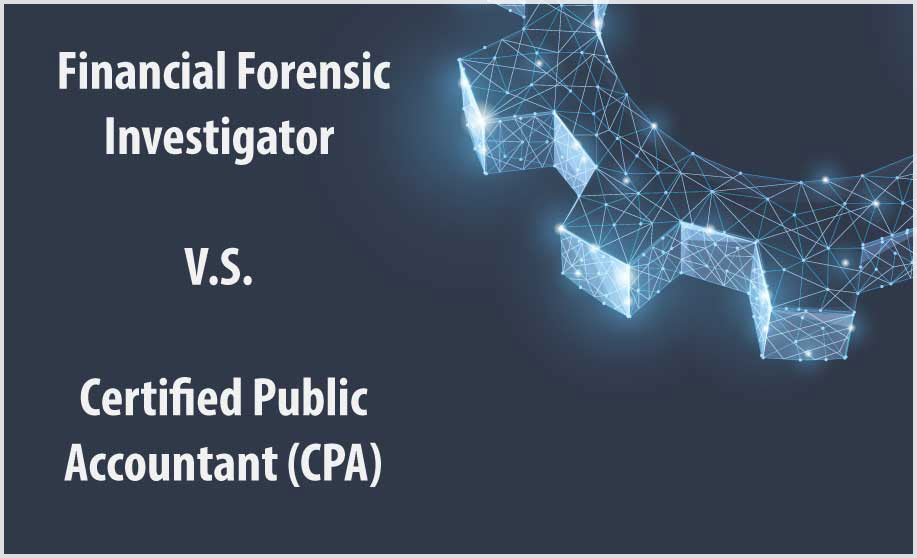 Attorneys whose clients have financial problems requiring financial analysis and investigation might be unsure if they need a Certified Public Accountant (CPA) or a Financial Forensic Investigator. We want to identify what each does so you can choose wisely according to your needs. Certified Public Accountants (CPAs) and Financial Forensic Investigators are professionals in the accounting field, but their roles, responsibilities, and areas of expertise differ significantly. While both play crucial roles in finance and accounting, they serve distinct purposes and cater to unique needs within the industry. This article will explore the key differences between a CPA and a Financial Forensic Investigator.
Attorneys whose clients have financial problems requiring financial analysis and investigation might be unsure if they need a Certified Public Accountant (CPA) or a Financial Forensic Investigator. We want to identify what each does so you can choose wisely according to your needs. Certified Public Accountants (CPAs) and Financial Forensic Investigators are professionals in the accounting field, but their roles, responsibilities, and areas of expertise differ significantly. While both play crucial roles in finance and accounting, they serve distinct purposes and cater to unique needs within the industry. This article will explore the key differences between a CPA and a Financial Forensic Investigator.
Certified Public Accountant (CPA)
A Certified Public Accountant (CPA) is a professional accountant who has met specific education and experience requirements, passed the Uniform Certified Public Accountant Examination, and fulfilled any additional state licensing requirements. CPAs are trained in various accounting principles, auditing, tax preparation, and fiscal management. They provide a wide range of services, including auditing attestation of financial statements, preparing tax returns, consulting on financial matters, and helping individuals and organizations maintain financial compliance.
CPAs are considered generalists in the field of accounting, as they possess a broad knowledge of accounting practices and principles. They work in various industries, including public accounting firms, private companies, government agencies, and non-profit organizations. CPAs are responsible for ensuring that financial records are accurate, financial statements are prepared in accordance with relevant regulations, and taxes are filed correctly and on time. Generally, your hired CPA cannot testify as an expert in a case involving you or your business because they may be a fact witness in your case and, therefore, lack objectivity.
Financial Forensic Investigator
A Financial Forensic Investigator, on the other hand, is a specialized accounting professional who blends accounting and investigation regarding financial disputes, fraud, and misconduct. These professionals generally receive Federal and State law enforcement training and maintain their knowledge through training. They are experts in analyzing financial data, uncovering financial irregularities, and providing litigation support to attorneys to prove or disprove the financial issue. Financial Forensic Investigators often work closely with family law attorneys, business and corporate attorneys, individuals, and law enforcement agencies to gather evidence, analyze financial transactions, render reports, and testify in court as expert witnesses. These professionals are usually also Certified Fraud Examiners (CFE).
Unlike CPAs, Financial Forensic Investigators such as the team at Sage Investigations have specialized experience and training in forensic accounting techniques, fraud detection, investigative procedures, tracing, report writing, and testimony in depositions, arbitrations, and trials. They are skilled in computerized techniques for tracing funds, analyzing data to identify fraudulent activities, and quantifying financial damages. Financial Forensic Investigators play a critical role in uncovering financial fraud, embezzlement, money laundering, and other financial crimes, as well as assisting in business litigation support to hold perpetrators accountable.
Key Differences
1. Specialization: CPAs are generalists in the field of accounting, while Financial Forensic Investigators are specialists in forensic accounting, fraud detection, and litigation support.
2. Focus: CPAs primarily focus on traditional accounting services such as recording day-to-day financial transactions, preparing periodic financial statements, ensuring statements comply with accounting standards, and supporting budgeting, investing, and financial planning. Financial Forensic Investigators focus on detecting asset misappropriation and financial statement fraud, tracing funds and gathering electronic evidence, calculating economic damages and asset valuations, and providing litigation support and expert witness services.
3. Skills: CPAs possess a broad skill set in accounting principles and practices, while Financial Forensic Investigators have specialized skills in forensic accounting techniques, fraud detection, investigative procedures, proving intent, litigation support, and expert witness services.
4. Clientele: CPAs work with a diverse range of clients, including individuals, businesses, and organizations, while Financial Forensic Investigators typically work with attorneys and corporate entities involved in financial investigations and legal disputes.
In conclusion, while both CPAs and Financial Forensic Investigators are essential professionals in the accounting field, their roles, responsibilities, and areas of expertise distinguish them from each other. CPAs provide general accounting services to a broad range of clients, while Financial Forensic Investigators such as the team at Sage Investigations specialize in investigating financial fraud and providing litigation support in legal proceedings. Understanding the differences between these two professions is crucial for individuals and attorneys seeking accounting services or financial investigative support.
The Sage Investigations team is here to support you with financial investigations and are financial expert witnesses. When you need to learn the truth about matters of financial fraud, call us at 512-659-3179 for a free phone consultation. Learn about our team and visit our website at www.sageinvestigations.com


 Call
Call